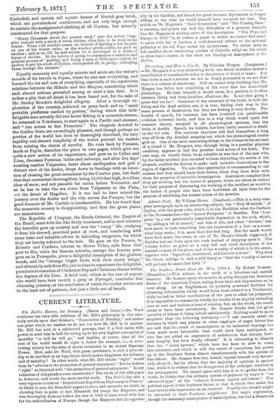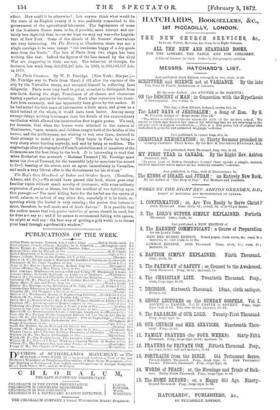The Southern States Since the War, 1870 - 1. By Robert Somers.
(Macmillan.)—This volume is the work of a laborious and careful observer. Mr. Somers spent six months in going through the Southern States of the American Union, noting down facts and impressions as he went along. As an Englishman, he probably possessed facilities for obtaining information which would have been refused to a Northerner, while he bad no bitter recollections of the past to affect his judgment. It is impossible to summarize briefly the results of an inquiry extending over so vast and various a tract of country, but, on the whole, the result seems to have been satisfactory. Mr. Somers thinks that the great question of labour is being solved satisfactorily. Nothing could be more emphatic than the following testimony :—"I can scarcely recall an instance in which any planter or other employer of negro labour has not said that the result of emancipation in its industrial bearings has been much more favourable than could have been anticipated, or who has not added an expression of satisfaction that slavery, how- ever roughly, has been finally effaced." It is interesting to observe that the " share system," which here has been so slow to come into existence, and which is still the rarest of exceptions, has grown up in the Southern States almost simultaneously with the system of free labour. Mr. Somers does not, indeed, express himself very favour- ably about it ; but he allows that the majority of opinions is against him, while it is evident that he disapproves of the principle involved in the arrangement. We cannot agree with him if, as we gather from his words, he thinks that the ordinary system of payment by wages is "an advanced type" of the "relation between capital and labour." The political aspect of the Southern States is that in which they make the least favourable impression on an observer. Possibly the remark might be extended to their Northern neighbours. But negro supremacy, though the necessary consequence of emancipation, has had a disastrous effect. How could it be otherwise? Let anyone think what would be the state of an English county if it was suddenly committed to the government of the agricultural labourers. The legislatures of some of the Southern States seem to be, if possible, more corrupt and cer- tainly less dignified than is—or we hope we may say was—the Legisla- ture of New York. Some of the details of Mr. Somers' observations are very interesting. On The Battery at Charleston there was not a single carriage to be seen except "the handsome buggy of a dry-goods man from the North." The loss of Paris from two sieges has been nothing like that. Indeed the figures of the loss caused by the Civil War are staggering in their amount. The valuation of Georgia, for instance, has sunk from 618,232,387 dole, in 1860, to 202,563,557 dole. in 1870.







































 Previous page
Previous page